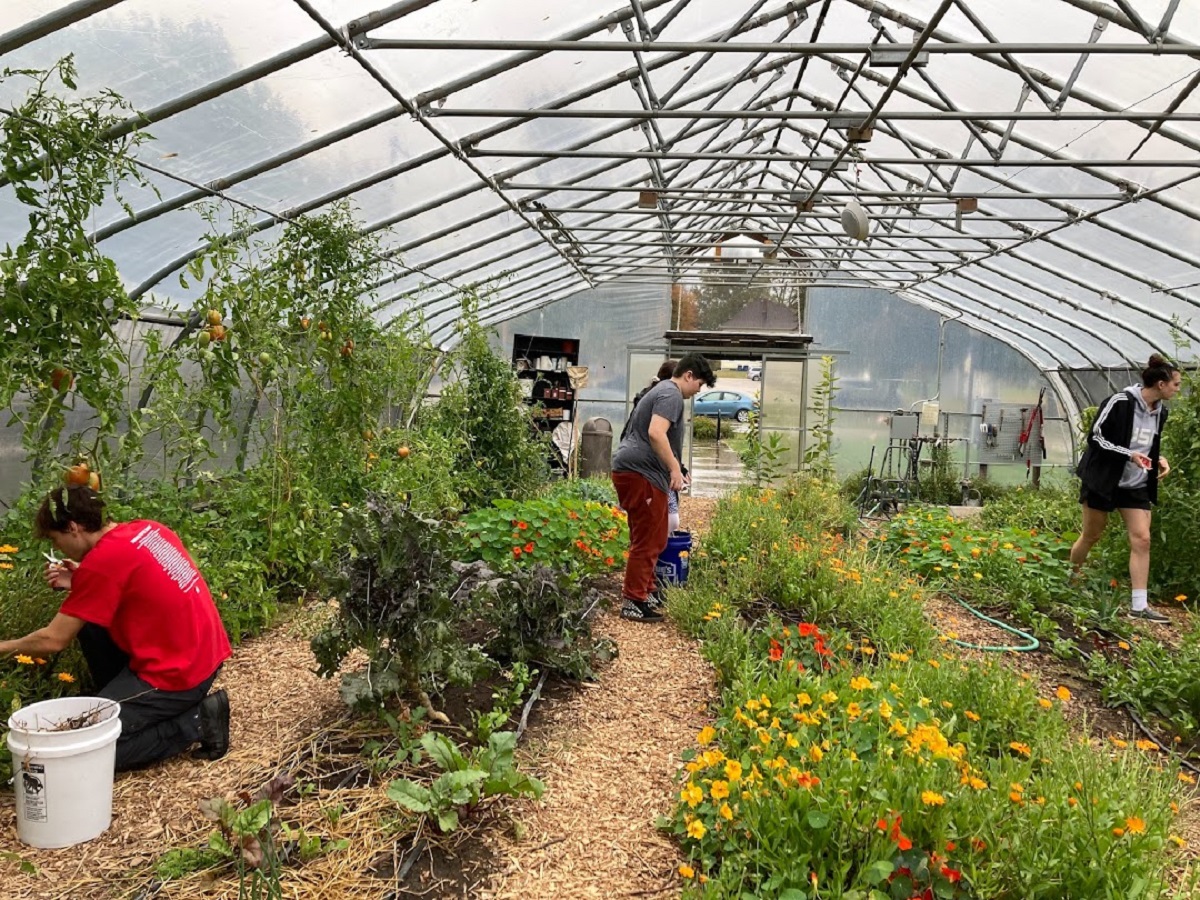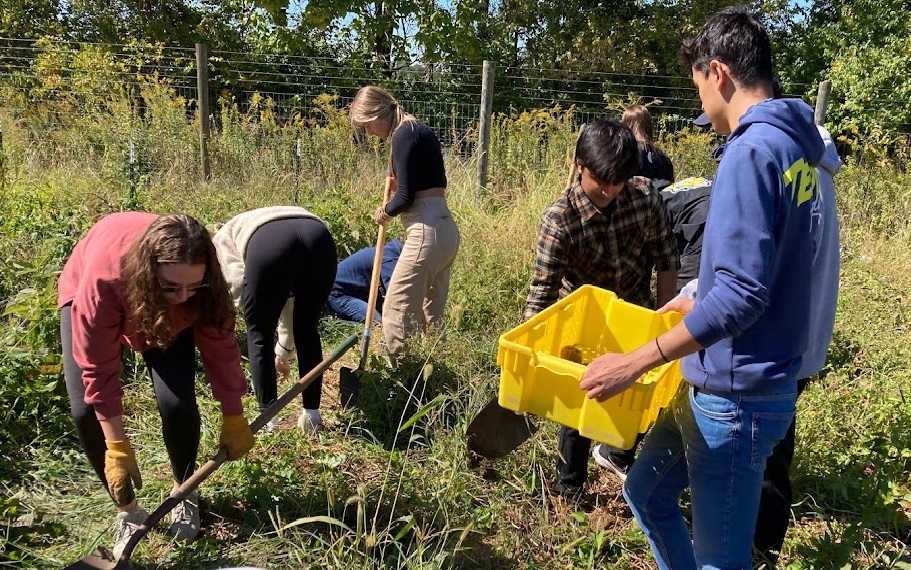Campus Farms Provide More Than Produce to School Communities
- by Elise Kulers

Students at work in the high tunnels at Knox College’s campus farm in Galesburg, IL
It’s fall in Indiana, which means it’s finally time to harvest the potatoes. Twenty DePauw University first-years are spending the morning at the Ullem Campus Farm in Greencastle, IN. Rather than sitting in a classroom, they are outside enjoying the first wisps of fall, bringing shovels down into the rich soil to unearth the starchy golden gems below. These freshly harvested spuds will make their way into the nearby Bon Appétit kitchen where they’ll be roasted, boiled, or baked, and then served to students, some of whom might have had a hand in getting that potato from soil to plate.
This kind of symbiotic collaboration with campus farms in the Midwest and beyond is a natural fit for our culinary teams: our chefs are granted access to the freshest, most flavorful produce while reinforcing Bon Appétit’s longstanding commitment to small, local producers. In this case, local means only steps from the kitchen. At the same time, student farmers learn how to run a small-scale farm, made self-sufficient due to the purchasing agreement with Bon Appétit teams who commit to buying up to 100% of their annual yield.
Aside from the valuable access to hyperlocal fresh produce, the future viability of these student-run farms is important due to the countless other benefits they provide to local food systems and campus communities: offering a unique educational space, enhancing the ecological health of the land, and inspiring the next generation of sustainable growers.

DePauw students harvest potatoes on the campus farm.
Farming in an Outdoor Classroom
At Knox College in Galesburg, IL, farm manager Tina Hope demonstrates how to prune cucumber vines nearing the end of their season, spread hay to reduce pest pressure, and seed cover crops to prepare the beds for fall. Each week, students in her Urban Agriculture class spend one day in the classroom and one day at the Knox Farm, which serves as a living laboratory to apply the ideas and concepts of regenerative agriculture into practice. The class not only provides essential labor to help run the farm, but it also gives students of any academic discipline the chance to gain hands-on experience with growing food, thus creating more informed members of our food system, inspiring potential future farmers, and instilling the significance of closed-loop systems.
While campus farms often host classes across a range of departments throughout the semester, there is also ample opportunity for learning outside of the classroom. For many campus farmers, this learning happens over the summer: while college campuses are quieter, the fields are teeming with life.
At the St. Olaf College farm, STOGROW, in Northfield, MN, three campus farmers are hired each season to manage the whole process of preparing the land, planting, managing weeds, harvesting, and delivering the final product to dining hall kitchens. It’s a crash course in soil health, plant biology, organic farming, and small business management all in one. In the spirit of experiential learning, STOGROW farmers are encouraged by the Bon Appétit team to grow whatever they’d like. Former farm intern Grace Mennerick shared, “I’m so glad we get the freedom to plant what we are excited about because I feel so much more pride,” especially when those initial dreams turn into a successful harvest.
Just down the street at the Carleton Farm, the what-to-grow decision is tactical. Because the chefs at Carleton College are attentive to what kinds of seasonal produce they already buy from other Farm to Fork vendors in the area, they ask campus farmers to grow vegetables they don’t already buy from a designated vendor. In recent years, farm interns have been asked to grow several varieties of kale and cucumbers, with plenty of room for creativity for whatever else they’d like to plant. While these first-time farmers might receive some guidance from experienced professors and other small farmers in the area, students tend to learn how to run a farm on the fly, an impressive feat in leadership, collaboration, and hard work, with some delicious fresh vegetables as an added benefit.
Caring for the Land
Using chemical-free, sustainable, climate-friendly farming practices tends to define the approach of the campus farms on Bon Appétit campuses. While yield is important, the institutional supports and guaranteed market that are unique to our campus farms provide a safety net of sorts that allows for experimentation – including careful consideration of inputs, providing a net positive impact for the surrounding air, water, soil, and ecological communities that rely on the land. As Jeanette Pope, the Director of Sustainability at DePauw University put it, “the number one product of the Ullem Campus Farm is healthy soil,” revealing the top priority is to support robust ecosystems while simultaneously producing food.
At Lawrence University in Appleton, WI, the connection between SLUG (Sustainable Lawrence University Gardens) and Bon Appétit extends beyond the produce, deep into the soil itself. In addition to growing food for Anderson Commons, their main campus café, the student-led SLUG team also manages a giant compost pile for the whole campus. Their kitchen team saves food scraps created during food prep to add to the pile, which is turned and eventually spread on the fields, contributing to the small farm’s soil fertility in the coming seasons. This key partnership allows our teams to divert food from landfill, a necessary aspect of our shared goals to limit the carbon footprint of our food system.
Growing Food and Future Farmers
There are clear benefits for campus food systems provided by student-led farming operations, but these benefits are felt more broadly when examining the bigger picture. The average farmer in the U.S. is nearly 60 years old and ever rising, carrying deep implications for our food supply in the not-so-distant future. Campus farms pose a promising solution to this issue by raising the next generation of food producers, providing inspiration, support, and a safe environment to experiment and grow key knowledge and skills, backed by the ongoing support from Bon Appétit teams.
This coming spring, after the land thaws and students are eagerly soaking in the sunshine after a cold winter, campus farmers around the country will be preparing for the planting season ahead. As farm interns sow endless varieties of heirloom seeds, those soon-to-be cucumbers, tomatoes, kale, and more will be harvested and transported across campus to the capable hands of our Bon Appétit chefs. They’ll finally make their way onto the plates of students, powering our next generation of leaders and changemakers, including some up-and-coming farmers.